- Home
- William Goldman
The Novels of William Goldman Page 3
The Novels of William Goldman Read online
Page 3
“I’m sure they both take after you, Mrs. Firestone,” Jamie Wakefield said.
“Gallantry,” Charlotte said. “Undeniable gallantry. See, Aaron? It’s true what I say about Southern men. They have—what would you call it, Mr. Wakefield?”
“I don’t know, ma’m.”
“Flair,” Charlotte said. “That’s as good a word as any. Style. Southern men have style.”
“If you say so, ma’m.” Jamie Wakefield nodded.
“Why, I remember some of my beaus when I was growing up in Roanoke. I remember ...”
Fortunately, Deborah appeared.
Jamie Wakefield stood silently, looking at her. She was wearing a dark green dress and it contrasted perfectly with her pale red hair. “Mr. Wakefield, my daughter Deborah,” Charlotte began. “Deborah, this is Jamie Wakefield from Dallas.”
“How do you do, Mr. Wakefield,” Deborah said.
“Yes, ma’m.” Jamie nodded, looking at her.
Charlotte saw them to the door, and when they were gone she whirled around, eyes bright, arms stretched wide. “Aaron,” she said, “we have great expectations.”
For the next month Deborah and Jamie dated several times a week and every weekend. Jamie was inexperienced, backward at times, ill at ease. He took her to the movies and for coffee after, where she did most of the talking, chattering on about whatever came into her mind, while he simply nodded, sipping his coffee and nodding, looking at her. Then they began going to New York. They ate sometimes at Le Pavilion—Jamie’s father liked Le Pavilion—and they went to the theater on Saturday nights, and everything seemed to be living up to Charlotte’s hopes until Deborah found out she was pregnant.
Charlotte’s reaction to the news was quite remarkable. They were having dinner, Deborah and Charlotte and Aaron, sitting at the small table in the corner of the kitchen, and Charlotte was commenting about how happy she was and how happy Deborah was and how even Aaron seemed happier than usual and wasn’t it wonderful what one person like Jamie Wakefield could do for the spirits of one family and the high cost of weddings and was there ever a better time of day than suppertime with a family all together when Deborah burst uncontrollably into one quick wave of tears and then gave forth the news. In the ensuing silence, Deborah half closed her eyes, tilting her face up toward her mother, ready for the blow.
Charlotte simply put her fork down. “You’re sure?”
Deborah nodded.
“Jamie?”
Deborah shook her head.
“Who, then?”
Deborah sat frozen.
“Tell me—” Abruptly Charlotte stopped and said “No.”
Deborah nodded yes.
“The Catholic, I might have known,” Charlotte said, and she put the tips of her fingers against her closed eyes, talking very quietly. “It is not going to happen and that is all there is to it. I simply will not allow ...” She opened her eyes. “Are you sure it isn’t Jamie?”
Deborah nodded.
“How do you know?” Charlotte asked, no longer talking quietly.
“Jamie’s never touched me,” Deborah whispered.
Charlotte reached across the table and took her daughter’s hand, stared at her daughter’s eyes. “We can remedy that, can’t we, baby?” Deborah said nothing. “Can’t we, baby? Can’t we, baby?” Staring and touching, Charlotte went on. “Can’t we, baby? Can’t we, baby? Can’t we, baby?”
Deborah was never one to argue with her mother.
When Jamie arrived that night Deborah was waiting for him, sitting in the living room. “Where’s your mother?” Jamie asked. “It doesn’t seem as if I deserve to see you without talking with your mother a while first. Sort of a price of admission.”
“Mother had to go to New York for the evening. Some cousin of hers’ is in town.”
“Well, I’ll miss her,” Jamie said. “I’ll truly miss her.” He took off his tweed coat and folded it over a chair. “You look very pretty, Deborah.”
She smiled at him. “You always say that.”
“It’s the truth is why.”
Deborah wore a black sweater open at the throat with a thin strand of pearls around her neck. “Hey,” she said, giggling. “Guess what I discovered today. Guess. Mother keeps a bottle. Isn’t that amazing? Do you want a drink?”
“No,” Jamie said.
“True blue Jamie Wakefield,” Deborah answered. “Lips that touch liquor will never touch his. I’m going to have a drink. A big strong one.”
She disappeared into the kitchen and Jamie could hear the sound of an ice tray splitting open. He rubbed his palms against his trousers. Deborah came back carrying two glasses. “I brought you one anyway. In case you change your mind.” She handed it to him and they both sipped in silence for a while.
“Aaron’s at the movies,” Deborah said. “Like always, Aaron’s at the movies.”
Jamie nodded.
They sipped a while longer.
“The lights bother my eyes,” Deborah said. “Jamie, turn off the lights.”
“What’s got into you anyway? ‘Jamie, turn off the lights.’ ”
Deborah giggled. “I’m just trying to get you alone in the dark, silly. That’s all.”
Jamie looked at her. “You are?”
“I are.”
“Oh.” Slowly he walked to the wall switch and flicked it off. The room was dark momentarily, but then they began getting accustomed to the moonlight. Jamie sat across the room from her, holding tightly to his glass.
“Jamie Wakefield, you win the blue ribbon for stupidity. The world’s championship.”
“What did I do?”
“Why are you sitting over there? What’s the point of being all alone in the house with no lights anywhere to be seen if you’re going to sit a million miles away?”
“You want me to come sit beside you?”
“No. Move farther away if possible.”
He moved through the darkness and sat beside her. “Here I am,” he said, taking a long drink of bourbon.
Deborah began to laugh. “It’s just like kindergarten. I swear it is.” She laughed louder. “You might as well turn the lights back on. Never mind. I’ll do it.”
She made as if to move, but he took her hand. “No.”
“Well, why not?”
Her pearls glistened in the moonlight.
“Why not?”
Jamie put his drink down. His hands were trembling terribly.
“Why not?”
Jamie grabbed her. He dug his fingers into her shoulders and her face turned, moving up to meet his.
“Jamie,” Deborah said. “Jamie.”
He kissed her again and she pressed her body against his body, her arms locking around his neck. Her tongue flicked at his mouth while his hands pressed against her flat stomach. Slowly, hesitantly, his hands began moving higher until they were cupped around her breasts. “Yes,” Deborah said. Jamie began unbuttoning her sweater.
Aaron saw it all.
Standing in the darkness of the foyer, he saw it from the first rough kiss. There were times when it was hard to keep from laughing at what they said, at Deborah’s pseudo passion, Jamie’s overpowering sincerity. But he did not laugh. He watched instead as they disrobed, throwing their clothes to the floor, lying on the couch in the moonlight. Deborah still wore her pearls and Jamie had his socks on, but Aaron did not laugh. He moved closer as their bodies locked, Jamie astride her, Deborah moaning wonderfully beneath him.
When they were done Aaron left, slipping out of the house. Alone on the sidewalk, he began to howl.
They waited three weeks before Deborah made the phone call. Three weeks seemed suddenly an incredible length of time. Charlotte would stare at Deborah’s stomach in the mornings, then quickly look away. But finally the time came and Deborah made the call.
“Jamie?” she said. She was crying softly; the tears were real.
“Yes?”
“Jamie—”
“What? What is it? Tell me.
”
Deborah told him.
“Are you positive? It can’t be. It’s too soon.”
“I’m positive” was all Deborah said.
Jamie said nothing for a while.
“Come see me,” Deborah managed, crying harder now. “Come see me tonight, Jamie Wakefield. I’ll be waiting.”
“I’ll be there.”
He found the note as he came back to his room after class. A folded piece of paper, it had been slipped under his door. Jamie stooped, picked it up. Then he read it.
SHE LIES
SHE LIES
IT ISN’T YOUR BABY
IT ISN’T YOUR BABY
They waited for him on the front porch of the yellow frame house, Charlotte and Deborah and Aaron. It was a warm night. Deborah sat very still. Aaron paced. Charlotte could not stop talking. “Now don’t you worry, baby. Just as soon as he gets here we’ll go inside—won’t we, Aaron?—the minute he arrives you know we’ll just disappear—you understand, Aaron?”
“Yes, Mother,” Aaron said.
Charlotte turned to Deborah. “What time did he say he’d come?”
“Seven. He always comes then.”
“Lots of time, baby.”
Aaron paced faster.
“Aaron, you’re making me nervous,” Charlotte said.
“Terribly sorry, Mother.” Aaron sat.
“Lots of time,” Charlotte said.
“Maybe he won’t come,” Aaron said.
“Hush,” Charlotte told him.
“Well, maybe he won’t. Maybe he knows.”
Charlotte snapped, “Impossible.”
“I guess you’re right, Mother.” Aaron’s fingers squeezed the arms of the rocking chair.
“Lots of time,” Charlotte said at seven o’clock. She said it again at a quarter after and again at half past. “Lots of time. Lots of time.”
Aaron waited with them. He could not remember having been so wildly happy. He had never known until then how splendid was his hatred, and the strength of it surprised him, almost frightened him a little. Taste it, he thought. Go on. His sister stared straight into the quiet night. His mother turned constantly, gazing down Nassau Street for the boy, the expression on her face growing more and more desperate as the hours went by. Aaron’s body flamed. Giddy, he waited, exultant; he watched, enraptured, triumphant, revenged. Taste it. Go on. Go on. Taste it, bitch. Taste it, whore. Taste the wrath of Aaron Fire!
II
WALT WAS TRAILING BIG Nose Tim Connery while his mother died.
The June sun felt cold on Walt’s freckled skin and he knew his teeth were just aching to chatter. He was scared; no use denying it. But he was not ashamed of his fear. Who wouldn’t be afraid of Big Nose Tim Connery, wanted for grand and petit larceny, arson, fraudulent use of the U.S. mails, and who was—according to the poster in the post office where Walt got all his information—KNOWN TO BE ARMED. Big Nose Tim Connery stopped. Walt dashed behind a tree. Big Nose turned. Walt held his breath. A dozen or so lush streets away, in St. Louis’ wealthiest suburb, Walt’s mother lay dozing in her white bedroom, a nurse in an easy chair sitting close beside. The doctor, on his morning visit, had pronounced Emily Kirkaby to be “resting comfortably”—can you rest comfortably with terminal cancer?—but no one was kidding anyone anymore. It was simply a mathematical matter—seconds, minutes, perhaps days—until Emily died.
Big Nose Tim Connery started walking again, faster now. Walt, on the far side of the street, pushed his glasses up snug against the bridge of his nose with his left thumb, then dashed forward into the shadow of the next protective tree trunk. He continued on, from tree to tree, and as he passed some kids playing marbles on a lawn the thought crossed his mind that he must have looked like a nut. But what did kids know anyway? It was lonely work, gangbusting, and you just couldn’t care about appearances; you had your job to do and you did it and that was that.
Big Nose stopped again. Walt froze behind a tree. Big Nose took out a handkerchief and wiped his forehead. Walt noted the action down in his notebook with his pencil stub. He had a list of Big Nose’s activities for the past twenty minutes and it probably would come in handy at the trial. Walt peeked out from behind the tree and, seeing his quarry back on the move, darted out of the shadows toward the next tree, but Big Nose Tim Connery turned and Walt, caught between shelters, was momentarily visible, so he casually dropped to his knees and began searching for four-leaf clovers. Big Nose Tim Connery never suspected a thing. Walt had to smile. Walt the Whizzer. That was his favorite name for himself: Whizzer. His full name was Egbert Walters Kirkaby, and he hated it. Most everyone called him Walt, which was O.K., except his lousy brother Arnold, who called him Egbert or Berty. But Whizzer was the name he cherished above all. Walt the Whizzer. The Whizzer strikes again. Walt the great whizzer Kirkaby. Whizzer! That was a name. Up ahead of him, Big Nose was moving, so Walt got up from the clovers, confident now that the end was in sight, because Big Nose Tim Connery swung up the walk leading to a large bastard-Tudor house, knocked once and, when the door opened, disappeared inside. Walt made a note of the house number, then dashed to the house directly across the street. He rang the bell and when the door opened he said, “Pardon me, ma’am, but my name is Walt Kirkaby and could I use your phone please?”
The woman knew the name Kirkaby—everyone in the town knew that name—so she said “Certainly” and led him to the living room. Walt peered out the living-room window; it was perfect, the Tudor house across the street was completely within his sight so if Big Nose tried a getaway, the Whizzer would be on him in a flash. Walt picked up the phone, and when he got the police station he whispered, “Gimme Sergeant Quinlan. It’s life and death. Gimme Quinlan. Right away.”
Across town, in the white room, Emily Kirkaby sighed. It was a soft sound, trivial; for just a moment her numb lips almost parted. The nurse, roused, stood up, looking down on the still, gray woman. The nurse nodded and shook her head, a silly gesture, but what else could she do because the woman was dying and that was a shame. Tiptoeing to the door, she opened it and gestured to the large Negro lady keeping watch outside the door. The Negro lady nodded and shook her head too, then went downstairs to spread the untidy news. The nurse crept back, still on tiptoe, and assumed her position of command by the bedpost. In a moment the door opened and P. T. Kirkaby entered, the P. T. Kirkaby, followed by his older son, Arnold.
“How much time she got left?” from P.T.
The nurse moved her hands. Not very much.
“She say anything?” P.T. again.
“No.”
P.T. grunted. “Go outside if you want,” he said to Arnold.
“I’m O.K.,” Arnold answered, readying his tears.
Emily sighed a second time. This sound was so frail as to make the first seem like thunder. But they all heard it, and though they had no reason to be sure, they knew it was the last sound she was ever going to make.
“Emily,” P. T. Kirkaby said.
“I don’t think she can hear you.” The nurse.
“Nobody asked you, did they?”
“I’m sorry, Mr. Kirkaby.”
“So are we all.” He turned his big body. “Arnold, where’s Walt?”
Arnold let go with a few tears.
“Stop that and answer me. Where’s Walt? Wherever he is, get him! Get him! That crazy Walt, where the hell is he?”
“Sergeant Quinlan speaking.”
“Sergeant Quinlan?”
“Yes.”
“I’ve got Big Nose Tim Connery for you.” Walt tried very hard not to hear Sergeant Quinlan’s tired sigh.
“Is that you, Kirkaby?”
“Yessir, it’s me.”
“You again, Kirkaby?”
“Yessir, me again.”
“And you’ve got who this time?”
“Tim Connery. Big Nose Tim Connery. Wanted for grand and petit larceny, arson, fraudulent use—”
“Are you sure you’ve got Big Nose Tim Connery? Becaus
e I don’t believe you, Kirkaby. I’m not calling you a liar, understand; I just somehow do not—”
“But, Sergeant—”
“You remember last week, Kirkaby? Last week you had Willie ‘the Shiv’ Fusari. You called me and you swore up and down—”
“Please, Sergeant Quinlan. Before he gets away.”
“You swore up and down you had Willie ‘the Shiv’ Fusari, but when we checked it turned out you’d been trailing Rabbi Silverman of the St. Louis Synagogue. And two weeks before that you trapped Harry ‘the Weasel’ Trockman in the card room of the St. Louis Country Club. And—”
“It’s going to look awful bad on your record, Sergeant Quinlan.”
Another weary sigh. “What’s going to look bad on my record, Kirkaby?”
Walt pushed his glasses up snug against the bridge of his nose with his left thumb. “Oh, just that you had a red-hot tip on Big Nose Tim Connery and you let him get away.”
“Kirkaby, you are one smart boy.”
“Thank you, Sergeant Quinlan.”
The weariest sigh of all. “All right, Kirkaby, where’s Big Nose?”
“He’s lurking in the house at 274 South Elm. I’m calling from right across the street, so if he tries a getaway, I’ll stay on his trail. Don’t worry about that.”
“Hold on, Kirkaby.” The line went quiet. Walt stared out at the house across the street. “WHIZZER DOES IT AGAIN.” That would be how the Post Dispatch would put it. In big black type the size of the whole page. “OH THAT WHIZZER!” That would be the Globe-Democrat’s headline. “Topping off his already unbelievably fantastically incredible career, Walt the Whizzer Kirkaby today brought to justice the worst criminal we’ve ever had around here ... the modest Whizzer ... the handsome Whizzer ... the absolutely superb but shy Whizzer ... the ever-popular Whizzer ... the ... the ... ooohhhhhhh that WHIZZZZZZZZZERRRRRRRR!”
The nurse, embarrassed by the frail face of the dead woman, began to pull the sheet up and over, but she stopped, frightened, when P.T. said, “Don’t.”
“I’m sorry, Mr. Kirkaby.”
P.T. stood over his wife a while. He felt moved and he didn’t like that, not P.T., so he turned then and went to the bedroom door. “It’s over, Maudie,” he said to the large Negro woman.

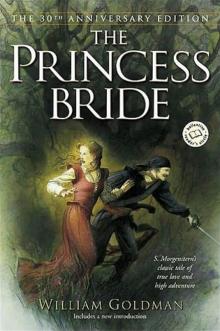 The Princess Bride
The Princess Bride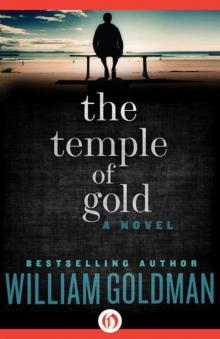 The Temple of Gold
The Temple of Gold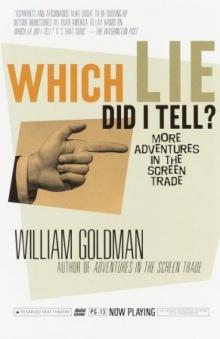 Which Lie Did I Tell?: More Adventures in the Screen Trade
Which Lie Did I Tell?: More Adventures in the Screen Trade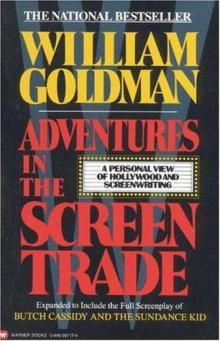 Adventures in the Screen Trade
Adventures in the Screen Trade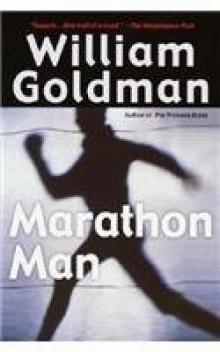 Marathon Man
Marathon Man The Novels of William Goldman: Boys and Girls Together, Marathon Man, and the Temple of Gold
The Novels of William Goldman: Boys and Girls Together, Marathon Man, and the Temple of Gold Boys and Girls Together: A Novel
Boys and Girls Together: A Novel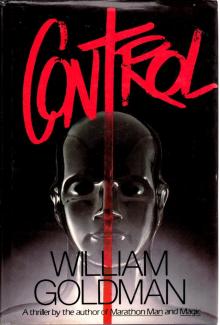 Control
Control The Novels of William Goldman
The Novels of William Goldman Which Lie Did I Tell?
Which Lie Did I Tell? Boys & Girls Together
Boys & Girls Together